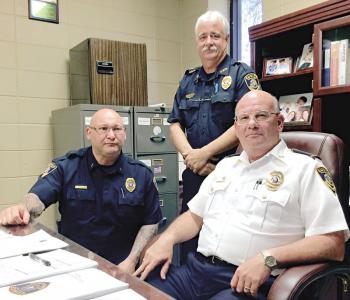Eunice Police increase focus on training
The Eunice Police Department is increasing its focus on training with an eye to standardizing how officers are initiated into the work and veterans are kept up to date, Eunice Police Chief Randy Fontenot said.
“It has become an issue,” Fontenot said of training.
“Every time we get served with a lawsuit, which happens regularly, one of the first things the attorney asks for is our policies, our training, the officers’ training records. This way we will be able to show them what type of training every officer is getting. To show it is standard training. It is training that all police departments should be using,” he said.
Fontenot, who is in his second year as police chief, said from 10 to 13 people are hired every year to fill one of the 46 jobs in the department. The are 34 sworn officers in the department, he said.
Lt. Donnie Thibodeaux was recently named training commander, he said.
Thibodeaux said he was sent to a management course through the University of Florida. The Eunice training plan is based on that used by the San Jose, California, police department, he said.
In addition, Officer Nicholas Cooley attended a training course for field training officers, he said.
The most intense focus of the training is given to new hires. They receive 12 weeks of on-the-job training.
The new officers spend two weeks working the jail and dispatch to learn those duties.
Next comes three three-week training periods where they are accompanied by a field training officer.
They also must complete the police academy in Lafayette.
During their time with a field officer, the new hire goes from observing the field training officer work to gradually taking the lead in performing the job.
New police officers are faced with acquiring a vast amount of knowledge, Thibodeaux said.
Fontenot said, “What I would like to see happen with this program is our officers are trained to the point where they are confident in their decisions they make on the street. The are going to be trained in how we interact with the public.”
Fontenot added, “I want to get everybody on the same page where everybody is training the same way so they will handle different situations pretty much the same as another officer would handle it depending on the circumstances.”
Fontenot said one way he realized the need for standardized training was he was not receiving any formal communication about how new officers were performing during training.
The field training officer program dates back to the 1990s, he said.
“What I realized once I’ve come here is there wasn’t much documentation done,” Fontenot said.
“And, I didn’t know what was going on with it. So, I started asking questions about the types of training that we were doing,” Fontenot said.
Fontenot realized there were field training officers, but said he was not getting any reports from them.
Thibodeaux said now there are training procedures such as checklist.
The training is a morale issue, Fontenot said.
“A well-trained police officer is going to be more confident in the job he is doing,” Fontenot said of training.
While the officers morale improves as he or she becomes more professional, the public receives a positive image of the police department.
Thibodeaux said applications are being taken within the department for field training officers.
“We are going to review those applications and pick the ones best able to perform in that position,” he said.
Fontenot said a lot of the current field training officers are lieutenants and they are not the ideal people to have the role even though they have the knowledge to do the job.
“Their job duties won’t allow them be that Velcro that’s needed to the officer that is being trained,” Fontenot said. “They get called into the office too much.”
Fontenot said it takes about six months to train an officer.
Thibodeaux said there much to learn. “Young guys never pulled over a car. Never walked into a domestic. They don’t know what to do.”
Fontenot said he remembers being nervous when he started his law enforcement career.
“You don’t know anything and you are going into situations not knowing, not sure what you can or can’t do,” Fontenot said.
Thibodeaux said military training or other law enforcement experience helps someone in the job.
“Training eases them into the work,” he said. “Usually after the six months are over they are usually a lot more confident in what they are doing, but they are still going to have some questions and in some cases it is learning experience that never stops,” Thibodeaux said. “You are always learning something new and the law is changing every year and you have keep up with that.”
- Log in to post comments

